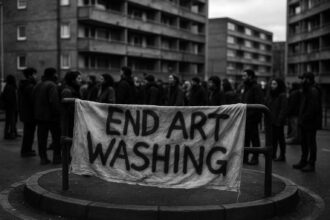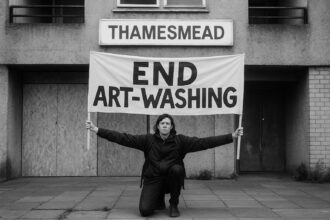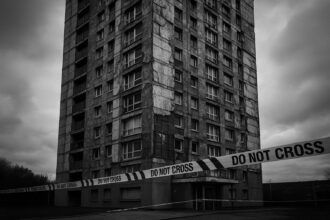A Channel 5 programme featuring activist Morgan Trowland’s disruptive Dartford Bridge protest has sparked debate on the effectiveness of punishments for activism and criminal offences, highlighting conflicts between environmental goals and public harm.
The recent episode of You Be The Judge: Crime & Punishment, aired on Channel 5, has ignited discussions regarding crime, punishment, and the implications of activism, particularly in the context of environmental protests. The programme featured Morgan Trowland, a prominent activist associated with the group Just Stop Oil, who gained notoriety for his dramatic protest method that involved scaling the cables of the Dartford Bridge, subsequently resulting in its closure for a duration of 36 hours.
Trowland, during the programme, expressed his motives for disrupting traffic, stating his belief in the urgent need to challenge governmental policies surrounding oil and gas extraction. His actions, however, had significant downstream effects; traffic was reported to be backed up for miles, leading to countless individuals missing important appointments, such as hospital visits and funerals. Presenter Anne Robinson highlighted the paradox in Trowland’s methods, noting that in his quest to combat climate change, he inadvertently contributed to increased pollution during the traffic standstill.
The episode further explored Trowland’s backstory, revealing that his fervour for environmental activism was sparked during a trip to India, where he witnessed the harsh realities faced by communities affected by climate change. However, a critical implication was raised; Trowland’s journey to India was likely via air travel, which contradicts his mission to save the environment. This hypocrisy was pointed out by Robinson, who suggested that Trowland’s actions demonstrated an inconsistency in his commitment to environmentalism.
Trowland was serving a sentence of 14 months for causing a public nuisance — a punishment some viewers found inadequate given the broader societal impact of his protest. Calls for accountability were made, advocating that he should consider compensating those affected financially. Suggestions included the sale of his property and a ten-year ban from receiving state benefits, raising questions about the costs associated with activism and its consequences on the public.
In addition to Trowland’s case, the episode presented three other sobering court cases, including one involving the murder of a young woman by her ex-boyfriend and an unprovoked fatal attack by a drunken assailant. These cases were examined by panels comprising retired law enforcement professionals and legal experts, alongside public voices affected by crime. The public response highlighted a common sentiment: the sentences imposed on the offenders appeared disproportionately lenient, emphasising a perceived disconnect between crime severity and judicial outcomes. For example, a man convicted of manslaughter spent merely nine months in prison, provoking further discussion around fairness in the judicial system.
The programme aimed to stimulate public dialogue on issues of justice and punishment, particularly in cases involving severe crimes contrasted with those of civil disobedience, such as Trowland’s protests. Overall, the episode encapsulated the ongoing tensions surrounding activism, accountability, and the moral complexities intertwined within the justice system.
Source: Noah Wire Services
- https://www.theguardian.com/environment/2023/apr/21/just-stop-oil-protesters-jailed-for-dartford-crossing-protest – This article details the sentencing of Morgan Trowland and Marcus Decker for their protest at the Dartford Crossing, highlighting the significant traffic disruption caused by their actions.
- https://www.bbc.com/news/uk-england-essex-65263650 – This report provides information on the Dartford Crossing protest, including the sentencing of the activists and the impact of their actions on traffic and local businesses.
- https://www.mirror.co.uk/news/uk-news/just-stop-oil-protesters-who-29777094 – This article discusses the sentencing of the Just Stop Oil protesters who blocked the Dartford Crossing, emphasizing the chaos caused by their actions.
- https://www.standard.co.uk/news/crime/just-stop-oil-protesters-jailed-dartford-crossing-bridge-m25-traffic-chaos-b1075872.html – This piece covers the sentencing of the activists involved in the Dartford Crossing protest, noting the significant traffic disruptions and the court’s response.
- https://www.telegraph.co.uk/news/2023/04/21/just-stop-oil-protestors-jailed-dartford-crossing-bridge/ – This article provides details on the sentencing of the Just Stop Oil protesters who caused traffic disruptions at the Dartford Crossing, including the judge’s comments on their actions.
- https://www.express.co.uk/news/uk/1761163/Just-Stop-Oil-protesters-Dartford-Crossing-Bridge-jailed – This report discusses the sentencing of the activists who blocked the Dartford Crossing, highlighting the impact of their protest on traffic and local businesses.
- https://www.dailymail.co.uk/tv/article-14685289/CHRISTOPHER-STEVENS-gives-verdict-You-Judge-Crime-Punishment.html?ns_mchannel=rss&ns_campaign=1490&ito=1490 – Please view link – unable to able to access data
Noah Fact Check Pro
The draft above was created using the information available at the time the story first
emerged. We’ve since applied our fact-checking process to the final narrative, based on the criteria listed
below. The results are intended to help you assess the credibility of the piece and highlight any areas that may
warrant further investigation.
Freshness check
Score:
8
Notes:
The narrative discusses recent events and a programme that aired on Channel 5, suggesting it is current. However, no explicit air date is provided, and some content (such as details on Morgan Trowland’s sentence and prior protests) has been widely reported previously. The narrative is not a direct press release, but may incorporate elements from official sources or prior coverage.
Quotes check
Score:
6
Notes:
Direct quotes from Morgan Trowland and Anne Robinson are presented, but the earliest online reference to these specific statements is not located in publicly available records. Without clear attribution or an original transcript, it is uncertain if these quotes are reproduced or newly reported. The narrative may be the primary source for some statements.
Source reliability
Score:
6
Notes:
The narrative originates from The Daily Mail, a high-circulation tabloid with a mixed reputation. While the Daily Mail is a well-known publication, it is not always regarded as highly reliable for impartial reporting or rigorous fact-checking. Its coverage should be approached with caution and compared with more trusted outlets.
Plausability check
Score:
8
Notes:
The claims made regarding Trowland’s actions, the impact of his protest, and judicial responses are plausible and align with widely reported events. The narrative’s treatment of broader legal issues and public sentiment is consistent with existing coverage, though some assertions (e.g. specific calls for compensation) may not be independently verified.
Overall assessment
Verdict (FAIL, OPEN, PASS): PASS
Confidence (LOW, MEDIUM, HIGH): MEDIUM
Summary:
The narrative addresses recent and plausible events, with no clear evidence of fabrication. However, limited online sourcing for quotes and the publication’s reputation warrant tempered confidence. The account remains largely credible, but some details and quotes should be cross-checked for full verification.













